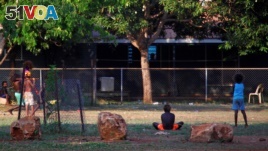23 July, 2018
People in Australia are leading efforts to save a critically endangered language.
At one time, an estimated 300 indigenous languages were spoken on the continent. Only about 90 are still spoken today.
Language is a central part of the culture of Australia's indigenous peoples, called Aborigines. Language helps Aboriginal communities understand their tribal roots, history and customs. It also gives them a strong sense of identity.

FILE - Members of the Australian Aboriginal community of Ramingining can be seen near their homes in East Arnhem Land, located east of the Northern Territory city of Darwin, Australia, Nov. 24, 2014. (REUTERS/David Gray)
European settlers arrived in Australia in the late 1700s. Experts say that colonization had a harmful effect on indigenous languages. Now, only about 60 of those languages are considered "alive" and in daily use. As older members of tribes die, other languages are likely to pass away.
In the central Australian desert near Alice Springs, only 20 people are fluent in Pertame, a language native to the area. But now, children are being taught its ancient words in hopes that it will not die out.
Kathleen Bradshaw and Christobel Swan are among the indigenous elders working to keep the Pertame language alive. Swan is one of the last remaining fluent speakers of Pertame. She is also founder of the Pertame School, which opened in Alice Springs two years ago. Bradshaw is a teacher at the school.
At Pertame School, children not only learn the language, but also cook traditional food, learn history and visit places that the community considers holy.
"I want to teach my children, grandchildren and great grandchildren our language and show our country to them so they can think and talk in Pertame," she told the Alice Springs News.
"Our old people, poor things, have all passed away now. There are only a few of us left to teach our kid how our old people used to live."
Swan, an expert on languages, has worked for many years at the Institute of Aboriginal Development. With the group's help, she has published language books on Pertame.
Forbidden to speak their language
Community leaders say that, for many years, white teachers refused to let them speak their native language. But they spoke Pertame in secret to help it survive.
Bradshaw recalls one of her experiences as a child.
"This teacher walked past and said do not speak that lingo at school and we promised ourselves that we would talk it in secret and just keep it going and, you know, talk amongst ourselves in secret. I think a lot of non-Indigenous people they do not understand how important it is for Aboriginal people to have their language and to keep it strong."
In some schools in Australia's Northern Territory, students learn in both English and an Aboriginal language. Many communities speak what is called "Aboriginal English" – a language that makes use of indigenous terms and culture. Its keeps some structures of standard English and includes words from Aboriginal languages.
Kriol is a north Australian creole language. A lot of children whose parents were fluent in different tribal languages speak Kriol.
Many non-indigenous Australians mistake indigenous languages for dialects of one larger language. However, the estimated 300 indigenous Australian languages were about as different from one another as, say, Russian and French.
Aboriginal Australians now make up about just 3 percent of Australia's population. They suffer high rates of poverty, poor health and imprisonment.
Historical evidence has suggested that Aboriginal people have been living in Australia for at least 65,000 years.
I'm Phil Dierking.
Phil Mercer reported this story for VOANews. Alice Bryant adapted his story for Learning English. Her report includes information from The Alice Spring News and other online sources. George Grow was the editor.
_______________________________________________________________
Words in This Story
creole – adj. a language formed from the contact of two languages
critically – adj. relating to or involving a serious condition
dialect – n. a form of a language that is spoken in a area and that uses some of its own words, grammar, and pronunciations
elder – n. a person who is older or a leader
fluent – adj. able to speak a language easily and very well
indigenous – adj. produced or living in a given area
lingo – n. a language